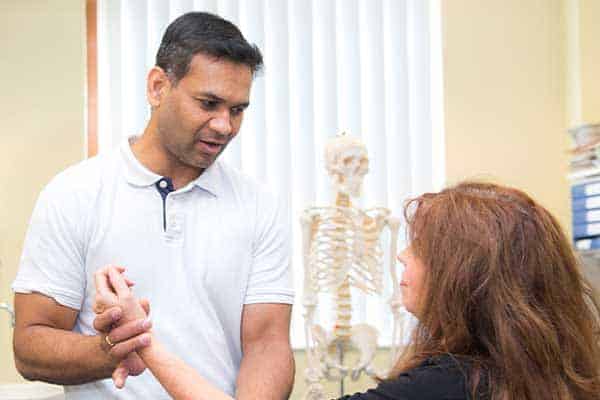Meralgia paraesthetica is pain, numbness and tingling in the front and outer side of your thigh.
This condition is also sometimes referred to as Bernhardt-Roth or LFCN (lateral femoral cutaneous nerve) neuralgia.
What causes meralgia paraesthetica?
There is a nerve called the lateral femoral cutaneous nerve (LFCN) that starts in your lower back and runs into the front of your thigh.
Meralgia paraesthetica is the medical term for what happens when this nerve becomes trapped, compressed or sensitive where it passes through the groin.
It can happen after surgery to your pelvis, hip, or spine and can also be caused by long-distance walking or sports such as cycling. It can be associated with wearing very tight clothing, with pregnancy, and possibly with weight gain.
Sometimes meralgia paraesthetica may be caused by a trauma, such as a car accident, or affected by other conditions, including diabetes.
What are the symptoms of meralgia paraesthetica?
For most people:
- There is painful patch of numbness and tingling on the front and outer side of your thigh.
For some people:
- The pain might also be referred into your groin or buttock area.
- You may feel increased sensitivity to heat in the front and outer side of your thigh.
- You might experience an itching sensation in this area.
How is meralgia paraesthetica diagnosed?
Your doctor can usually diagnose meralgia paraesthetica by talking to you about your symptoms and examining you. Other diagnostic investigations are not usually needed.
What are the treatment options for meralgia paraesthetica?
Self-management is often all that is needed to treat meralgia paraesthetica.
Your first priorities should be managing the pain, wearing loose clothing and changing any aspects of your lifestyle that might have contributed to the condition.
This may be enough to enable your symptoms to ease.
Discuss pain relief and other medication options with your doctor.
You could also aid your recovery with a programme of exercise, including mobility exercises for your hips, spine and pelvis, exercises to strengthen the muscles of your spine, abdominals, hips and buttocks, plus general cardiovascular exercise.
What is the prognosis (outlook) for meralgia paraesthetica?
Most people find that meralgia paraesthetica resolves naturally over time. This can take several months.
In the unlikely event that it does not clear up by itself, there are other options to discuss with your doctor, such as steroid injections or surgery, but these are not recommended.
How can I prevent recurrence of meralgia paraesthetica?
Since meralgia paraesthetica typically has no one identifiable cause, there is no sure way to avoid another episode.
However, there is every reason to believe that making changes to your lifestyle, such as wearing looser clothing, losing weight or altering your exercise habits, could help.

How to get referred
Find out how to get referred to Practice Plus Group MSK & Diagnostics for NHS treatment.




